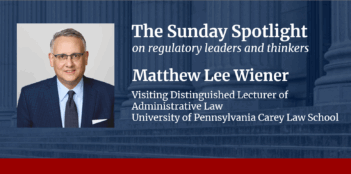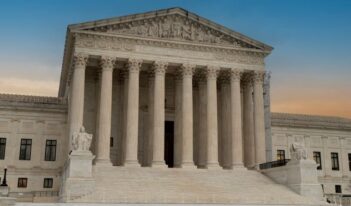
Congress should require independent regulatory commissions to perform cost-benefit analyses
Regulations are critically important to our economy and society, so it is not surprising that they have received a lot of attention in the past year. Dozens of bills have been introduced in the Senate and in the House to “remedy” some of the perceived problems with the process of developing, promulgating, and enforcing regulations. These proposals are generally well-intentioned, but when examined carefully most of them are simply not justified by any compelling need. Regulations have generally benefited our nation, so any proposed legislation that would further encumber the rulemaking process or add additional review or approval steps must be carefully evaluated before being adopted.
One area where Congress can and should act, though, would be to extend to independent agencies the requirements for cost-benefit analysis and centralized review that are currently contained in Executive Order 12866. Independent agencies are those multi-headed agencies – such as the Securities and Exchange Commission, the Federal Communications Commission, the Federal Trade Commission, the Consumer Product Safety Commission, the Federal Election Commission, the Commodities Futures Trade Commission, and the Federal Reserve – whose members do not serve at the pleasure of the President and can be removed only for good cause.
These independent agencies were not made subject to the requirements under either the Reagan or Clinton executive orders on cost-benefit analysis and centralized review of regulations. Advisors to both Reagan and Clinton concluded that presidents could legally extend these requirements, but both chose not to do so out of deference to Congress.
For several years now, many of us across the political spectrum have urged reconsideration of that deference. Our concern is that independent agencies are not typically engaging in the analysis that has come to be expected as a form of governmental best practice for regulatory agencies. For example, the 2011 OMB Report to Congress on the costs and benefits of major regulations shows that roughly half of the independent agencies’ rules over the past ten-year period had no information on either costs or benefits. Other rules that did contain such information had very little of it.
For all practical purposes, the way executive branch agencies and independent agencies conduct rulemaking is the same, so they both should be expected to gather and use information on the costs and benefits of new regulatory proposals. Of course, the differences between the two types of agencies in terms of their structure and their relationship to the President may suggest that the way the regulatory review process is structured and enforced need not be the same. For executive agencies, the Office of Information and Regulatory Affairs (OIRA) reviews their work and communicates with agency staff, who generally pay attention to, and usually heed, OIRA’s critiques or suggestions; if not, the issue can be elevated to political appointees and ultimately there is a meeting of the minds. If OIRA were to review independent agencies’ regulatory proposals, and they did not acquiesce in OIRA’s assessment, there might well be a question about whether the process was compromising the agencies’ independence.
Congress confronted this very question in the Paperwork Reduction Act, in which it provided for OIRA review of information collection requests from independent as well as executive agencies. While the act authorized OIRA to approve or disapprove paperwork from executive agencies directly, OIRA’s decision to disapprove paperwork from an independent agency could be vetoed by the agency upon a majority vote and an explanation of its reasoning.
Congress could adapt that approach for OIRA review of the analysis underlying independent agency rulemakings. OIRA could be required to provide its views in writing to the independent agency in question, after which the agency would have the opportunity to decide how to address OIRA’s comments before issuing its final regulatory action.
Since past presidents have been reluctant to extend requirements for economic analysis and centralized review by OIRA to the independent agencies out of deference to Congress, Congress could ameliorate these concerns by adopting a “Sense of the Congress resolution” that such a course would be desirable.
Alternatively, Congress could designate an entity outside the executive branch, such as the Government Accountability Office (GAO) or the Congressional Budget Office (CBO), to review independent agencies’ economic analyses. Although neither of these candidates has expertise or experience reviewing economic analyses comparable to OIRA, both do have the “virtue” of being more closely identified with Congress rather than the President.
However it is achieved, improving independent agencies’ analysis of their regulations has become more important than ever. In the Dodd-Frank Act alone, there are over 300 provisions requiring or enabling agencies, usually independent ones, to issue rules. With the large number of important regulations emanating from independent agencies, it is time to have these agencies subject to centralized review. Nothing focuses the mind like knowing someone will be reviewing one’s work.
This opinion essay in The Regulatory Review has been adapted with permission from testimony Professor Katzen delivered on July 20 to the Senate Committee on Homeland Security and Governmental Affairs.




